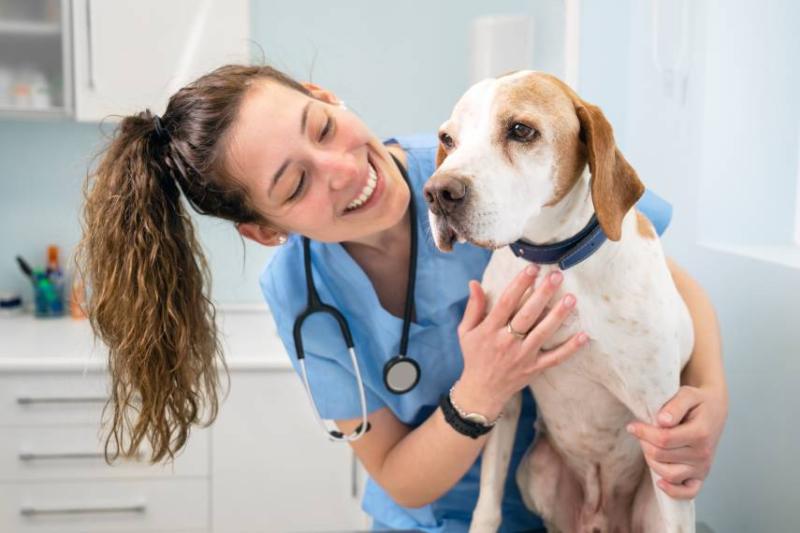About your Cocker Spaniel
The Cocker Spaniel gets its name from the woodcock it originally hunted. Even as a pet, they retain some of their hunting past with a love of retrieving, chasing and swimming, excelling in doggie sports like agility and scent work.
The breed has an inquisitive nose which can get it into trouble if an owner has not spent time teaching them to come when called.
Sociable, friendly and eager to please, they’re a popular choice for active families.
Cocker Spaniel features
Size
Usually small dogs, fully grown they can be anywhere from 38-41cm in height.
Weight
The typical weight of a fully grown Cocker Spaniel ranges from 13-14.5kg.
Typical lifespan
10 years, though this figure varies.
Colour
Black, red, golden, liver (chocolate), black and tan, liver and tan.
Coat
Medium length. Flat and silky and can shed a lot.
Temperament
Cocker Spaniels are attention lovers but can suffer from separation anxiety. You can learn how to deal with it here.
What conditions do Cocker Spaniels suffer from?
There are a few common Cocker Spaniel health issues:
GPRA (Generalised Progressive Retinal Atrophy)
An inherited eye disease that can lead to blindness.
Hereditary cataracts
A clouding of your dog's vision.
Acral Mutilation syndrome (AMS)
An inherited nervous system disorder seen in puppies where they lose their pain sensation in the lower limbs. Puppies will hurt themselves by licking and biting their paws.
Phosphofructokinase Deficiency (PFKD)
A metabolic condition that affects Cocker Spaniels resulting in exercise intolerance and muscle disease.
Elbow dysplasia
Abnormal development in the elbow joint, causing chronic pain and mobility issues.
Hip dysplasia
Hip joints that haven't developed normally, causing pain and poor mobility.
Ear infection
Floppy ears are susceptible to infection.
Atopy
A genetic tendency to develop allergies like asthma and eczema.
Familial nephropathy (FN)
A fatal kidney disease in young Cockers. Breeders must use the DNA test for FN to prevent it.
Adult-onset neuropathy
Another Autosomal Recessive condition seen in some older Cockers (typically aged seven to nine). It's a progressive weakness due to a neuropathy which can lead to walking and swallowing difficulties. Progression takes three to four years.
This list isn't exhaustive. Regular visits to the vet will help pick up these conditions early.
How to keep a Cocker Spaniel healthy
Research the breeder
The first step is ensuring the breeder has carried out the correct health checks for both parents before they mate. These tests include:
- general veterinary health check
- hip and elbow scoring
- eye testing
- inherited disease/DNA testing
- deafness testing
- respiratory function
- inbreeding tests
Cocker Spaniels need some specific breeder tests:
- eye tests as they're prone to glaucoma and other degenerative diseases
- hip dysplasia screenings
- insensitivity to pain tests
Always follow the advice of your vet. This gives a puppy the best chance to start in a healthy state.
Feed your dog the best food
See what your dog responds best to, but typically give them a high-protein diet with lots of slow-digesting carbs.
However, Cocker Spaniels are prone to obesity, so don't give them too much. It's worth talking to your vet about how much to feed them depending on their size, diet and exercise routine.
Exercise regularly
Give them the right amount of exercise and mental stimulation, brush them daily and give them lots of attention. For Cocker Spaniels, mental stimulation is as essential as physical exercise.
Visit the vet annually
It's a good idea to take your dog to an annual health check to pick up any issues early.
Most owners combine this with their pet's yearly vaccination boosters.
Your vet will check your pet's weight, heart, coat condition, eyes, ears and teeth to address any concerns you might have.
Remember that insurance doesn't typically cover routine visits. It's worth reminding yourself about what vet bills insurers cover.
Living with a Cocker Spaniel
Cocker Spaniel training
So, how much exercise does your lively Cocker Spaniel need?
Adult Cocker Spaniels need an hour of exercise every day when fully grown and developed, including walks, games and training time to give their brain a workout.
They're intelligent and eager to please, which makes them easy dogs to train. Training should start as early as possible alongside socialisation so that puppies grow up confident, sociable and well-behaved.
A lack of exercise and stimulation can lead to behaviour problems like excessive chewing and barking.
Cocker Spaniels respond best to positive reinforcement training, which uses rewards rather than punishment. For recommendations on local dog trainers and training classes, speak to your vet.
How to feed a Cocker Spaniel
Feed your dog good quality, complete food.
The amount depends on a dog's size and life stage, so follow the guidelines given on the food packaging or consult your vet.
Vets say it's better to split a dog's daily allowance into two or more meals a day. This helps spread their energy intake, and you can plan this around waking up, walking and going to bed.
Monitor your dog's weight regularly. Overweight or obese dogs are at much higher risk of developing conditions such as heart disease, diabetes, high blood pressure, joint issues and certain types of cancer.
You can read more about insurance for overweight pets.
Remember to factor in treats when working out how much to feed your dog. If you give your dog extras you should reduce their meals accordingly.
How to groom a Cocker Spaniel
Brush your dog's coat daily to keep it healthy and prevent matting. It's also a good idea to brush them through after walks to remove any debris which may have become stuck in the fur, especially around their legs.
Regular visits to a professional groomer every three months help keep your dog's coat clean and make brushing easier.
Cocker Spaniels are drawn to water, so you'll need to bathe them occasionally - especially after a muddy swim.
What information do you need for a dog insurance quote?
To get a dog insurance quote, we just need:
Your Cocker Spaniel’s details
- name
- gender
- age
- purchase or donation price
- spay or neuter status
- breed
Your details
- name
- date of birth
- address
- email address
- phone number
- preferred policy start date
Get a Cocker Spaniel quote
Stay prepared by giving your Cocker Spaniel cover with our pet insurance.
Our Lifetime Gold and Platinum cover have Defaqto's highest rating of 5 Stars. Plus, we have a range of other Lifetime and Time-Limited options on offer.
If you’re not sure which cover is best for your dog, then read our post on how to choose.


